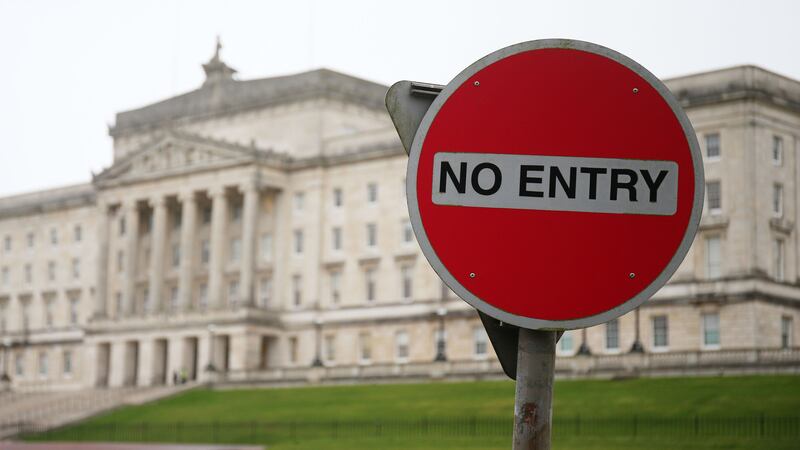SECTARIANISM does not work - in war or politics. That is the lesson from Stormont's latest incestuous crisis when, after 30 years of sectarian war and 20 years of institutionalised sectarian politics, we are left to reflect on 50 wasted years.
We are little further on from January 29, 1967, when the Civil Rights Association (CRA) was formed to demand fairness in an unfair society. Not fairness on a sectarian basis (one person one vote was denied to Protestants as much as Catholics) but fairness for all. Today's Stormont is no more fair or enlightened than the one of half a century ago.
So how and why did we squander fifty years and can we guarantee our children that we will not waste another fifty?
Stormont has failed because mandatory coalition on a sectarian basis produced two competing half-governments, each cynically pre-occupied with grooming its own electorate.
The evidence, for example, lies in special political advisers running the civil service, giving £2 million for the UDA-linked Charter NI and allocating £60 million for an apparently over-scaled Casement Park, while schools are bankrupt.
There was no one in government to cater for, or even identify, the common good. Instead, mutual sectarian inter-dependence diverted from failing public services.
(Against popular opinion, this column argued last week that cutting the Líofa grant was a DUP tactic, to be later reversed for inter-party negotiations. Guess what happened this week? Now, that's cynicism.)
Stormont's flawed system emerged from the SDLP's flawed analysis in the early 1970s that the problem here was one of two conflicting identities, later hardened under the Belfast Agreement into two separate nations.
It was derived from the British claim that they were here to keep two warring factions apart. It failed to recognise Britain's role in fomenting sectarianism (making the SDLP analysis more Catholic than nationalist) and it lacked any socio-economic content or context. The problem was flags, so the solution must be shared flags.
(If you think Britain was an honest broker, look at how British intelligence ran loyalist paramilitaries for the war's first twenty years. It then significantly controlled both loyalist and republican groups for the final ten years.)
Following the Hume-Adams talks, Sinn Féin accepted the SDLP's analysis in a major departure from the teachings of Tone, Pearse and Connolly. SF sought to represent only Catholics. Protestants and Dissenters were placed in unionism's foster care. (Yes, you might find a pun in that.)
Much of the party's policy both in and towards Stormont was heavily influenced by Martin McGuinness. Had he been healthy, Stormont would not have collapsed.
Sinn Féin's new approach represents an unusually confused and disorganised transfer of power over northern affairs from McGuinness to Adams.
The party has several objectives in collapsing Stormont: it allows time to find a replacement (possibly Mr Adams himself) for Martin McGuinness; it absolves SF for failing social and public services, especially for southern consumption; it places Brexit at the heart of post-election negotiations and heads off growing grassroots rebellion against DUP appeasement and Stormont's overall failure.
Mr Adams's Belfast speech last Saturday was to re-establish authority. ("Let me through, I am your leader.")
Meanwhile, Stormont's Opposition, the SDLP and the UUP, believes we should have a more polite form of sectarianism. In the event of direct rule, the SDLP even wants the Irish government involved in running the north, presumably on the basis that Irish austerity is so much better than British austerity.
Warming to their theme, Dublin foreign minister, Charles Flanagan, wants us to protect Stormont. (If he lived here, he would realise that we need protection from Stormont, not for it).
So, half a century after we founded the civil rights movement, sectarian self-interest has brought us back to where we started. Sadly, in view of the civil rights gains, we could have got here without firing a shot; without a single death; without accepting the legitimacy of partition and without polarising an already fractured society.
We have made little progress since British army violence drove the CRA off the streets. Along with Britain, the main opponents of the civil rights movement were Ian Paisley and later, the Provisional IRA, which argued that the state should be destroyed, not reformed. The thoughts and deeds of both led to sectarian war and today their political descendants have failed the people of the north with their sectarian politics
So, we do not need changes to our system of government. We need a new system, one which re-visits Britain's sectarian "solution" to the Irish problem, as enshrined in the Good Friday Agreement. Anything less will waste another fifty years.









